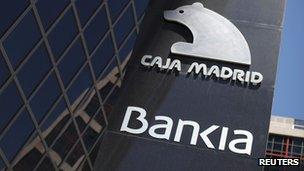Six burning questions for Spain
- Published

Prime Minister Mariano Rajoy has a lot on his mind
Things are happening in Spain.
On Thursday, the government unveiled a draconian budget - its latest attempt to get its borrowing under control.
And on Friday, independent auditors confirmed that the country's banks would need an extra 59bn euros ($76bn; £47bn) - most of it from the government - to prop them up.
And then there's one other big event that many suspect is drawing closer - Spain's government is under pressure to request a formal bailout, not just for its banks, but also for itself.
Here, then, are the six big questions that are likely to be playing on Prime Minister Mariano Rajoy's mind:
Can the government cut its borrowing?
Some economists would say this is a wrong-headed question.
Spain is stuck in an economic trap, they argue, with large debts, an overvalued currency and collapsing property market, and it is entirely right for the government to borrow and spend unprecedented amounts to prop the economy up.
But Spain's government has little choice about cutting its deficit - the gap between how much it spends each year and how much it earns in taxes.
That's because neither the financial markets, nor fellow eurozone governments, nor the European Central Bank (ECB) are willing to lend Spain the shortfall indefinitely.
Last year, the total government deficit stood at 8.5% of GDP (the economy's annual production).
Mr Rajoy has promised to cut this to 6.3% this year and to under 3% by 2014.
The problem is that cutting the deficit is proving much harder than expected.
Spending cuts hurt the economy, leading to lower tax revenues and higher spending on unemployment benefits, and hence more government borrowing than anticipated.
This year's 6.3% deficit target has already been revised up from 5.3%, and is still widely expected to be missed.
To complicate things further, much of the borrowing is carried out by Spain's regional governments and is beyond the direct control of Madrid.
And these figures do not take account of the large hidden losses in the banking sector that the government may have to shoulder.
How big is the hole at the banks?
An independent audit of the banks confirmed on Friday that the banks are short of some 59bn euros, or almost 6% of Spanish GDP.

Spain's banks were hit when the housing bubble burst
This "hole" is the amount of capital that must be injected by the authorities to absorb the losses that the banks (especially regional savings banks) might suffer on all the loans they made to property developers and mortgage borrowers during the housing bubble of the last decade.
Some of the 59bn may also be provided by private sector investors, or by writing off the amount owed to some existing investors in the banks.
The housing bubble has burst and many of those loans cannot be repaid.
The eurozone has already made 100bn euros available from its rescue funds to plug this hole, although many investors suspect that the banks' needs may (eventually) exceed even this total.
For Spain, the question isn't just the size of the banks' losses.
It is still not clear who will ultimately bear them. Will it be the entire eurozone, through its 100bn-euro investment (as Madrid hopes), the Spanish government itself, or the (mostly Spanish) private sector investors in the banks?
The Irish government was sunk by the losses incurred by its own banks after it foolishly offered to guarantee them. Spain hopes to avoid the same fate.
Can the regions be brought into line?
Like the savings banks, Spain's regions are victims of the country's property boom and bust.
During the boom years, tax revenues were swelled by stamp duties on property sales, and by income taxes paid by immigrants that came to work on the country's construction sites.
Over a million Catalans took to the streets of Barcelona to march for independence
Regional governments' tax revenues have collapsed during the recession. Yet their spending commitments - many of them dictated by laws written in Madrid - have not gone away so suddenly.
Their collective budget deficits were 2.9% of Spanish GDP in 2011, contributing about a third of the total government deficit.
Many regional governments now find it impossible to borrow from the markets, so the central government has set up an 18bn-euro rescue fund for them.
Five regions have already indicated they will need a collective 15bn euros from the fund, almost exhausting it.
In other words, the regional governments' debts are becoming central government debts.
The biggest region to ask for help is Catalonia. It is also the grumpiest.
The Catalans point out that their economy - arguably the strongest in Spain - makes an oversized contribution to central government taxes.
Instead of a bailout, Catalonia's government would rather get a bigger share of those tax revenues.
Many Catalans would go a step further. This month, more than a million massed in Barcelona to demand full independence for their linguistically distinct region.
Considering how much Catalonia contributes to Madrid's coffers, this is something the rest of Spain could ill afford.
Should Spain fear the markets?
Afraid that they might never get repaid in full (at least, not in euros), the financial markets until recently were threatening to pull the plug on Spain.
The implied interest rate the government faced for a 10-year loan hit 7.6% in July - far above the 1.2% faced by Germany, and unaffordable for Madrid in the long run.
But the government's problems were the least of it. Of more immediate concern was what was happening at Spain's banks.
Foreign lenders and investors started to demand their money back last year.
More worryingly, many companies and individuals - including Spaniards - also began moving their money out of Spanish bank accounts into safer foreign (particularly German) ones.

Debt equals slavery, says the writing on the wall at Spain's central bank
The best measure of how much money has fled Spain is the amount that the Spanish central bank has had to borrow from the ECB in order to replace it: 434bn euros as of August, or 40% of Spain's GDP.
If the government and the banks cannot borrow, then they cannot support the Spanish economy.
The government cannot pay benefits or public sector workers' wages. Banks cannot provide loans (not even to the government).
In other words, the panicky exodus of money from Spain threatened to push its economy off a cliff.
Things are (relatively) calmer now, largely thanks to the ECB.
Last December, the ECB's head, Mario Draghi, announced unlimited new three-year loans for eurozone banks. Spain's banks have been the biggest recipients.
And this month, he stared down opposition from Germany's central bank to offer eurozone governments open-ended assistance by buying up their shorter-term debts.
But this latest ruse, dubbed "Outright Monetary Transactions", comes with a big string attached - Spain's government must first submit itself to a rescue loan from Brussels, with full conditionality attached.
Should Spain fear Brussels?
Greece, Ireland and Portugal had to submit themselves to the humiliation of "conditionality" to get their bailouts.
They have had to accept painful spending cuts, tax rises and labour market reforms dictated by their eurozone peers, and to open their finances up to inspection by the European Commission, IMF, and ECB every three months.
Spain's economy is twice as big as those three countries put together.
And that economic heft has translated into political heft, helping Spain avoid any conditionality on the rescue loan already lined up for her banks.
But if Spain's government must now also seek a bailout for itself - as stipulated by the ECB - then it too must accept a loss of control over its own affairs.
How great a loss is far from clear. But there is good reason to think the terms will be more generous than those afforded to Greece, Ireland or Portugal.
It's not just that the other eurozone governments, above all Germany, see Spain as too big to push around. They are also increasingly cognisant that conditionality has backfired in Greece and elsewhere.
Should Spain fear its own voters?
Independence protesters in Catalonia are just one headache for Mr Rajoy.
A bigger one is that Spanish voters are already sick of spending cuts.

The Indignados are out on the street again
His socialist predecessor, Jose Luis Zapatero, won plaudits in Brussels for the zeal with which he attacked the deficit.
Voters rewarded him in November with a landslide election victory for his conservative opponents.
Since then, Mr Rajoy has tried to go easy on spending cuts. But now the markets (and the ECB) are giving him little choice.
With the economy back in recession and youth unemployment above 50%, the indignados - including thousands of students protesting against their dreadful job prospects - have continued to fill Madrid's Puerta del Sol.
And Mr Rajoy's poll ratings have dropped since he agreed to a Brussels bailout for the banks.
Unsurprisingly, he is doing everything he can to avoid an even bigger bailout for his own government. He would far rather push through spending cuts of his own initiative than have them imposed on him from abroad.
Yet he may have reason for hope, for the simple reason that his problems increasingly look to be the entire eurozone's problems as well.
In Greece, the popular backlash against spending cuts almost toppled the entire political establishment, raising the prospect that the country could eventually stop co-operating with Brussels altogether and leave the euro.
It has set a terrible precedent, and eurozone leaders in Brussels, Paris and Berlin have little appetite to push Spain to the brink as well.